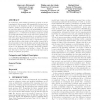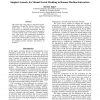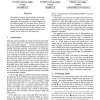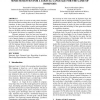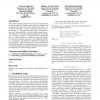147
Voted
ATAL
2011
Springer
14 years 2 months ago
2011
Springer
In modal logic, when adding a syntactic property to an axiomatisation, this property will semantically become true in all models, in all situations, under all circumstances. For i...
123
click to vote
KI
2008
Springer
15 years 20 days ago
2008
Springer
The research aim of this paper is to represent everydaylife patterns of thought like "Because I know, what you think I think ..." by a process on a machine, which is inv...
ENTCS
2006
15 years 2 months ago
2006
We implement a specific protocol for bit exchange among card-playing agents in three different state-of-the-art epistemic model checkers and compare the results. Key words: Crypto...
120
click to vote
CORR
2006
Springer
15 years 2 months ago
2006
Springer
We present an epistemic logic incorporating dynamic operators to describe information changing events. Such events include epistemic changes, where agents become more informed abo...
123
click to vote
ECAI
2010
Springer
15 years 3 months ago
2010
Springer
In the clock semantics for epistemic logic, two situations are indistinguishable for an agent when it makes the same observation and the time in the situations is the same. The pa...
128
click to vote
IJCAI
2003
15 years 3 months ago
2003
We propose a purely logical framework for planning in partially observable environments. Knowledge states are expressed in a suitable fragment of the epistemic logic S5. We show h...
146
Voted
AIA
2006
15 years 3 months ago
2006
Epistemic logic allows to reason not only about situations, but also about the knowledge that a set of agents have about situations. In later years, epistemic logic has been appli...
104
Voted
CLIMA
2007
15 years 3 months ago
2007
The proof theory of multi-agent epistemic logic extended with operators for distributed knowledge is studied. Distributed knowledge of A within a group G means that A follows from ...
137
click to vote
AIML
2008
15 years 3 months ago
2008
Arbitrary public announcement logic (APAL) is an extension of multi-agent epistemic logic that allows agents' knowledge states to be updated by the public announcement of (pos...
106
Voted
ATAL
2008
Springer
15 years 4 months ago
2008
Springer
Some natural epistemic properties which may arise in applications can only be expressed in standard epistemic logic by formulae which are exponentially long in the number of agent...
